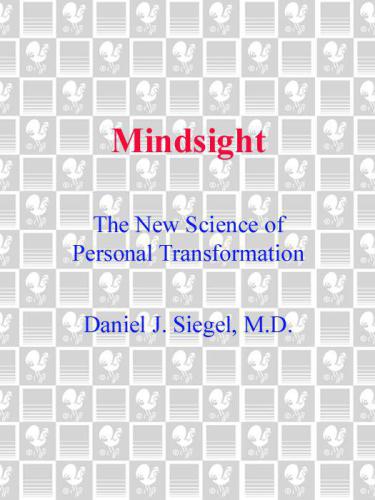
Mindsight
The New Science of Personal Transformation
کتاب های مرتبط
- اطلاعات
- نقد و بررسی
- دیدگاه کاربران
نقد و بررسی

October 12, 2009
Siegel (Parenting from the Inside Out
) combines Western neuroscience with Eastern meditation in an exciting exploration of how a troubled mind can right itself. Drawing on current science and case studies, Siegel, a clinical professor of psychiatry at UCLA School of Medicine, reinforces “the idea that the power of reflection allows us to approach, rather than withdraw, from whatever life brings us.” And learning to stay with a feeling, even a threatening one, is the beginning of discovering that this emotion is just “a set of neural firings in our brain.” There is enormous pain in the clinical cases: 31-year-old Allison’s back pain conceals a painful memory; 12-year-old Sandy is stuck in a panic expressed in obsessive-compulsive behavior. But there is also enormous hope—that therapy, sometimes even without medication, can guide a patient through life. Siegel’s method isn’t a quick fix and doesn’t sugarcoat reality: The mindful traits of serenity, courage and wisdom involve accepting our place in the order of things.” He challenges his patients to a life of tough work and convincingly suggests it will be well worth the effort.

November 23, 2009
Siegel (psychiatry, Univ. of California, Los Angeles; The Developing Brain) presents the theory of mindsight, combining the practice of mindfulness, or focused awareness, with neuroplasticity-the theory that the brain is transformed anatomically and physiologically through learning and social interaction. Siegel defines mindsight as the ability to focus attention on the workings of the mind and use that information to change and redirect inner experience. Using the image of a closed fist representing the parts, functions, and processes of the brain, he explains the underlying neurobiology of the mind as a system of neural networks monitored and reshaped by thought and experience. With examples from his own practice, Siegel describes how he has used mindsight to treat clients with mild symptoms of post-traumatic stress disorder, depression, obsessive-compulsive disorders, and other mental disturbances. Though Siegel admits in an endnote that more research is needed before conclusions can be made linking neuroplasticity to issues of mental health, he maintains that mindsight as a cognitive therapy shows promise in future mental illness treatments. Verdict This will appeal to those fascinated by recent studies in neuroplasticity, e.g., Norman Doige's The Brain That Changes Itself, and of the role of mindfulness in behavioral and physical change as depicted in Sharon Begley's Train Your Mind, Change Your Brain.-Lucille M. Boone, San Jose P.L.
Copyright 2009 Library Journal, LLC Used with permission.

December 15, 2009
The concept of emotional intelligence, or EI, rather than IQ as the true barometer of social success has been a hot topic in psychological circles since Daniel Golemans landmark Emotional Intelligence (1995). Yet, according to UCLA psychiatrist Siegel, Golemans personal friend and fellow Harvard alum, the notion of mindsight, or the minds knack for stepping back and analyzing its own thought processes, is just as critical. Drawing on cutting-edge neurobiological research and Eastern meditation practices as well as studies conducted by his own, L.A.-based Mindsight Institute, Siegel presents a convincing case that mindsights dual focus on mindfulness and empathy can literally rewire the brain and catalyze greater personal fulfillment. In 12 lucid yet scientifically grounded chapters, he provides the evidence for mindsights powerful effect on human behavior and then presents a guidebook for developing and applying mindsight in ones life. Unlike his earlier, more academic works, Mindsight is refreshingly accessible, offering solid practical advice while avoiding the naive optimism of many mainstream self-help books.(Reprinted with permission of Booklist, copyright 2009, American Library Association.)

























دیدگاه کاربران